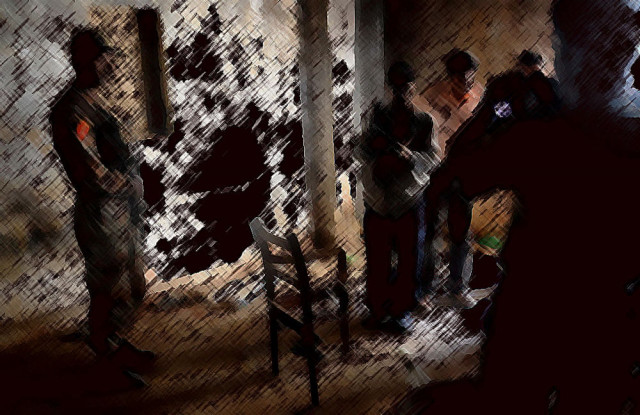The torture cells of Lahore
Police officers admit that torture is still their preferred method of interrogation.

The torture cells of Lahore
For neuroscientists and those who care about human rights, there are two arguments against torturing someone for information: that it is wrong, and that it doesn’t even work.
Try telling that to certain elements in the Punjab police.
“When we torture those in our custody they scream and cry with pain, but unless they tell us what we are asking for, we don’t stop,” says a low-ranking police official in the Criminal Investigation Agency (CIA) of Punjab police in Lahore.
Given his involvement – and apparent relish – in torturing suspects, it is no surprise the official does not want to be identified. He says he has been in the force for 22 years, and has recently been transferred to the superintendent office, where he now does clerical work for the agency.
“I used to hit people using chittar (a coarse leathery torture instrument) on their bottoms,” he says while laughing, adding that criminals deserve to be treated with such contempt. What’s more, he believes the method works: “Without torture, no one speaks.”
The policeman is careful to point out that during such torture – which includes tying the person to a charpoy and hitting his feet, and hanging him upside down – no marks are left on the body of the victim.
When asked what happens if a suspect does not cooperate, the official casually says that other family members are picked up and tortured until the suspect talks.
All of this happens behind the closed doors of the CIA headquarters in Lahore, known as the Kotwali office. Other police sources and regular news reports confirm the existence of a torture cell in the building.
“Usually four to five people interrogate the accused, during which this torture happens, but it is only for particular crimes like robbery, murder and organised crime,” the CIA source says.
Intriguingly, terrorists are ‘cracked’ in other ways: “Since terrorists are brain-washed into believing they are right, the police need to tackle their case through mental torture techniques,” he adds.
While the CIA official openly admits to torture, investigation officers at other police stations go a step further in their justification, saying it happens all around the world.
“In the US they do water-boarding and put people in refrigerated cells without clothes. Our methods are less cruel,” says Zahid, an assistant sub-inspector from the investigation unit at the North Cantt police station in Lahore.
He speaks freely about his sections’ unpleasant methods, even listing the different techniques: “We sleep-deprive the person, over-feed him, make him sit on his knees for hours, and even hit him with a chittar.”
Like the CIA official, Zahid also speaks of the ‘no marks’ policy to conceal torture. “We are very careful,” he says, aware that the government recently set up teams to monitor police performance and complaints.
Meanwhile, a high-ranking police officer, who asked not to be named, says that torture has moved out of police stations and into private properties, as Station House Officers don’t want to get caught. “Most SHOs who are the favourites of seniors torture people in custody without fear, because they know the top bosses cannot say anything to these cops as they do all their dirty work,” the police official added.
Zaman Khan, spokesperson for the Human Rights Commission of Pakistan in Lahore, says that “the police have a violent-based mindset that has not changed. And it is not just the police but other agencies who have safe houses across Pakistan where torture goes on.” Khan adds his disappointment that parliamentarians have not taken up the issue, leaving the fight to civil society and the media.
Published in The Express Tribune, December 11th, 2011.



















COMMENTS
Comments are moderated and generally will be posted if they are on-topic and not abusive.
For more information, please see our Comments FAQ